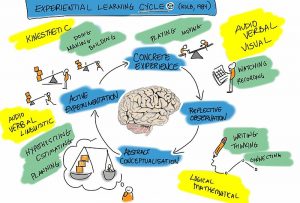3.4 Kolb’s Experiential Learning Cycle

Kolb’s model (1984) is based on theories about how people learn, this model centres on the concept of developing understanding through actual experiences and contains four key stages:
- Concrete experience
- Reflective observation
- Abstract conceptualization
- Active experimentation
The model argues that we start with an experience – either a repeat of something that has happened before or something completely new to us. The next stage involves us reflecting on the experience and noting anything about it which we haven’t come across before. We then start to develop new ideas as a result, for example when something unexpected has happened we try to work out why this might be. The final stage involves us applying our new ideas to different situations. This demonstrates learning as a direct result of our experiences and reflections. This model is similar to one used by small children when learning basic concepts such as hot and cold. They may touch something hot, be burned and be more cautious about touching something which could potentially hurt them in the future.
Video: Kolb’s Reflective Cycle
Learn more about Kolb’s Reflective Cycle by watching the video by Cheryl Reynolds [2:47] below.

